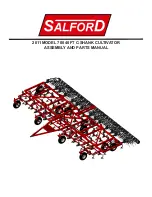
5
Lawnaire
IV & V
with
EST
SAFETY
MANEUVERING SAFELY
In general
- Slow down before turning.
- Be aware when approaching blind corners,
shrubs, trees, tall grass or other objects that may
obscure vision.
Slope Operation
-
S
lopes are a major factor in loss-of-control and
tipover accidents that sometimes lead to severe
injury or death. All slopes require extra caution.
- Before operating on slopes, evaluate the risks
involved.
- Do not operate on slopes if uneasy or uncertain.
Ultimate responsibility for safe operation on
slopes rests with the operator.
- Do not operate steep slopes.
A slope is too steep if:
- The machine must be crabbed (turned partially
sideways uphill) to drive across the slope.
- The machine turns downhill going across the
slope.
- You are uneasy about being on the slope
- With walk behind machines, operate across
slopes, not up and down.
- Avoid starting or stopping on a slope. If wheels
lose traction, disengage the traction clutch and
proceed slowly straight down the slope.
- Keep all movement on the slopes slow and
gradual. Do not make sudden changes in speed
or direction.
- Do not turn on slopes unless necessary, and then
turn slowly and downhill when possible.
- Do not operate near dropoffs, ditches or
embankments. The machine could suddenly turn
over if a wheel runs over the edge or an edge
caves in.
- Follow the manufacturer's recommendations
for wheel weights or counterweights to improve
stability.
WARNING
MAINTENANCE AND STORAGE SAFETY
In general
- Maintain machine according to manufacturer's
schedule and instructions for maximum safety
and best results.
- Park machine on level ground.
- Never allow untrained personnel to service ma-
chine.
- Guards should only be removed by a qualified
technician for maintenance or service. Replace
when work is complete.
- Adjust or repair only after the engine has been
stopped and the tines have quit rotating.
- Replace parts if worn, damaged or faulty.
For best results, always replace with parts
recommended by the manufacturer.
- Disconnect spark plug wire(s) before making any
repairs.
- Do not dismantle the machine without releasing
or restraining forces which may cause parts to
move suddenly.
- Provide adequate support, e.g. jackstands for
lifted machine or parts if working beneath.
- Do not put hands or feet near or under rotating
parts.
- Clean up spilled oil or fuel thoroughly.
- Replace faulty mufflers.
- To reduce fire hazards, keep the engine, muf
-
fler, and fuel storage area free of grass, leaves,
debris buildup or grease.






































